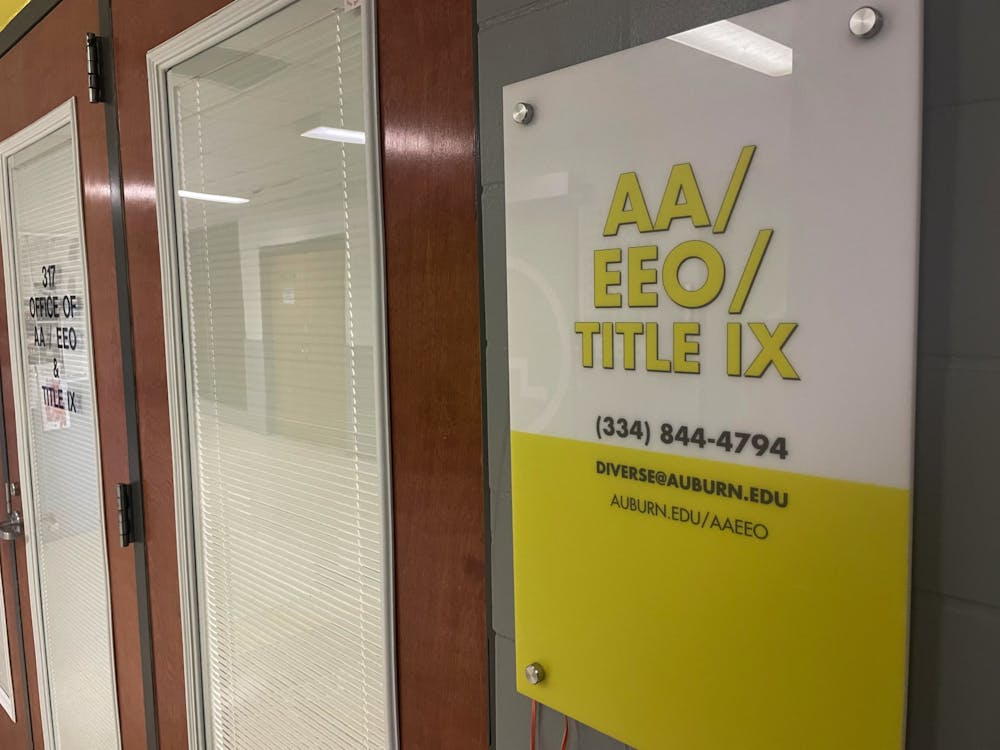While many who come to Auburn often think highly of it, they must come to the realization that it is still a college campus where unfortunate things like sexual assault happen. However, the University has resources to help survivors of sexual assault and related incidents, the most notable resource being the Title IX office.
The original Title IX policy as drafted under the federal Department of Education states that, “no person in the United States shall, on the basis of sex, be excluded from participation in, be denied the benefits of, or be subjected to discrimination under any education program or activity receiving Federal financial assistance.”
The Title IX office, which is led by Title IX Coordinator Kelley Taylor and Deputy Title IX Coordinator Katherine Weathers at Auburn, investigates claims of sexual assault, sexual harassment, sexual exploitation, intimate partner violence and stalking when they are reported to their office with the desire to launch an investigation.
“[To report] you can come in, you can call, you can go online and fill out an online report anytime, you can tell a full-time employee or anyone with authority or responsibility, and they will report to us, and we will reach out to them,” Taylor said. “[People who report] need to know that when we reach out to them, they don’t have to come in and talk to us, and we will not make them. We are just trying to reach out with resources and support.”
Taylor said that the Title IX office does not “summon” survivors of sexual assault and that their primary goal is to aid both the accuser and the accused throughout the process to ensure a fair conclusion is made.
Weathers said that she didn’t want students to be afraid of reporting to their office due to a fear that the office will drag them into some long process. In fact, Weathers noted that full investigations are a smaller part of what their office does.
“The majority of what we do is help [the accuser and the accused] know where resources are, [resources like] Safe Harbor and counseling,” Weathers said.
The Title IX office can also reach out to faculty who are involved with a student who reports to them to ask that they provide aid to them to set them up for future success.
Both Taylor and Weathers mentioned that they issue a lot of no-contact directives and are one of two groups on campus able to do so.
A no-contact directive denies any contact between a complainant and a respondent – one who files a complaint and the one who the complaint is filed against, respectively – in a case, including contact through mutual friends. Weathers said it also applies to social media and spoof phones – phones that provide the incorrect caller ID.
“We can [issue no-contact directives] even if [the complainant] does not want to file a complaint,” Taylor said.
Taylor noted that oftentimes, no-contact directives solve many of the issues that could have led to an investigation, and Weathers added that these directives do not have to be issued to another Auburn student. She said that it could be an employee, a student at another college or university and even other states.
“We’re a lot more than just a police office where you’re filing a report and that somebody is going to get in trouble. We’re a lot more than that,” Weathers said. “We’re about support and resources and helping people.”
However, if a student wants to proceed into an investigation, the office is more than welcome to allowing that. Students must file a complaint and the office’s investigators investigate both sides including witnesses.
After evidence has been compiled, there a hearing with an external hearing officer who examines the evidence and makes a decision. If a respondent is found responsible, proper repercussions are fleshed out and imposed on the student.
However, a student – both the complainant and respondent – can request an informal resolution at any time during the investigative process.
An informal resolution must be agreed upon by all parties, meaning the complainant, respondent and Title IX office. If all parties agree to go into an informal process, the requesting party writes up terms that are reviewed by the other party and the Title IX office. Revisions can be made until a mutual agreement is made on all fronts, and the process will be over.
“We have a very fine, strong group of folks working here who are professional, who are well-educated, committed, and I think [everyone] ought to give us a chance,” Taylor said. “We want all students to feel safe. Our office can provide resources and support to victims and those accused of sexual violence.”
Do you like this story? The Plainsman doesn't accept money from tuition or student fees, and we don't charge a subscription fee. But you can donate to support The Plainsman.

Tucker Massey, senior in journalism, is the content editor for The Auburn Plainsman.





